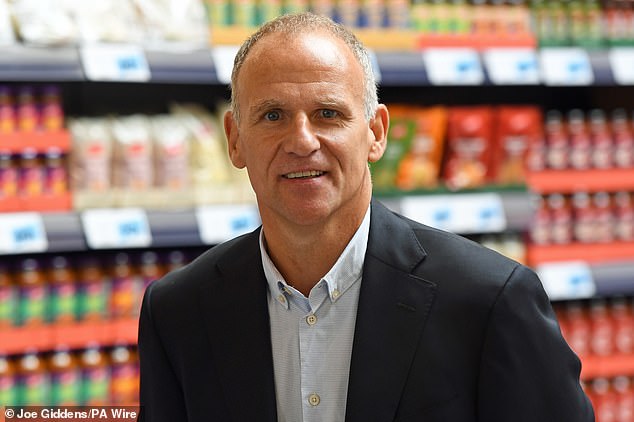Rarely do shares rise 5 per cent on the appointment of a chief executive, so the choice of 60-year-old ‘Drastic’ Dave Lewis as boss of Diageo raises expectations of a recovery.
After a bruising period in which the group’s value plummeted, chairman John Manzoni’s decision to choose an external candidate and go radical makes good sense.
Lewis’ reputation rests on the turnaround at Tesco, where he inherited an accounting scandal, surging debt and price competition from upstarts Aldi and Lidl.
His solution was to end the grandeur – closing the supermarket’s corporate headquarters in Cheshunt and concentrating management in Welwyn Garden City – shut superfluous stores, and discard extraneous activities.
Among enterprises sold were operations in fast-growing Asian markets, including Korea and Thailand.
Does this offer clues to his stewardship of Diageo? One obvious option for the liquor and stout group is to split and de-merge Guinness.

Fresh challenge: New Diageo chief exec Dave Lewis (pictured) led a successful turnabout at Britain’s top supermarket Tesco
GSK, where Lewis chaired consumer healthcare spin-off Haleon, offers a model. But spin-offs take time. As Tesco boss, Lewis opted for trade sales, reducing debt and restoring a dividend.
What he cannot do at Diageo is ignore its historic success in taking Johnnie Walker and Guinness worldwide.
One goal of Lewis’ illustrious predecessor Ivan Menezes was to establish Diageo as a luxury company by adding fashionable brands such as Casamigos tequila.
It has been hurt by changing tastes, weak spending in North America and a trend away from spirits.
Scotch brands such as single malt Talisker and Johnnie Walker Black and Blue labels have proved enduring.
But Trump tariffs hurt. There is no shortage of buyers when premium liquor brands are on sale. Family control in the global spirits world has been an obstacle to transforming deals.
In retrospect, despite Tesco’s domination in the UK, Lewis’ decision to sell out of the Far East may not have been the best, long-term growth strategy.
So, rather than jettisoning great brands, fixing slack management and stock control would be a good start.
Lewis should perhaps recall that Diageo used to be called Guinness. The name change came after the Distillers thalidomide tragedy and the Guinness share trading scandal of the late 1980s.
Heritage matters.
Private grief
The City, in the post-Brexit era, is still terrific at creating fresh, valuable enterprises plugged into fast-changing investment markets.
London-listed JTC, which provides services to investment funds in alternative assets such as private credit, has agreed to be swallowed by British private equity firm Permira for £2.7billion after a bidding war.
Other recent newish financial firms to be bought up at substantial premiums include private markets data provider Preqin, bought by BlackRock for £2.4billion in March this year.
Boutique adviser Robey Warshaw was purchased by Evercore in July and innovative insurance broker Inigo was sold to US Radian Group for £1.3billion in September.
The difference is that JTC is listed, and the buyer is British. Unlike other deals, which involved trade buyers, JTC is going to private equity.
The premium may look good at 38.6 per cent since the first offer was made in August of this year. But rarely do private equity firms come bearing gifts, so we must assume JTC is worth much more and will be disgorged rapidly.
Permira has a mixed history. It was partly responsible for the dismembering of motoring organisation the AA.
Its last venture in finance, Luxembourg-based fund administrator Alter Domus, was sold to Cinven for £4.3billion – a seven times return on investment – earlier this year.
My advice to JTC’s ‘shared ownership’ colleagues: be careful.
Top spin
Multi-billion private equity group CVC is not the only enterprise investing in sport.
Aquis-quoted minnow VVV Sports is forming an alliance with Wild Pickle Agency to take fast-growing sport pickleball – a blend of tennis, badminton and table tennis – to Europe, the Middle East and Africa.
The global market is valued at £2billion and is expanding at 15.9 per cent a year.
Worth watching.
DIY INVESTING PLATFORMS

AJ Bell

AJ Bell
Easy investing and ready-made portfolios

Hargreaves Lansdown

Hargreaves Lansdown
Free fund dealing and investment ideas

interactive investor

interactive investor
Flat-fee investing from £4.99 per month

Freetrade

Freetrade
Investing Isa now free on basic plan

Trading 212

Trading 212
Free share dealing and no account fee
Affiliate links: If you take out a product This is Money may earn a commission. These deals are chosen by our editorial team, as we think they are worth highlighting. This does not affect our editorial independence.
